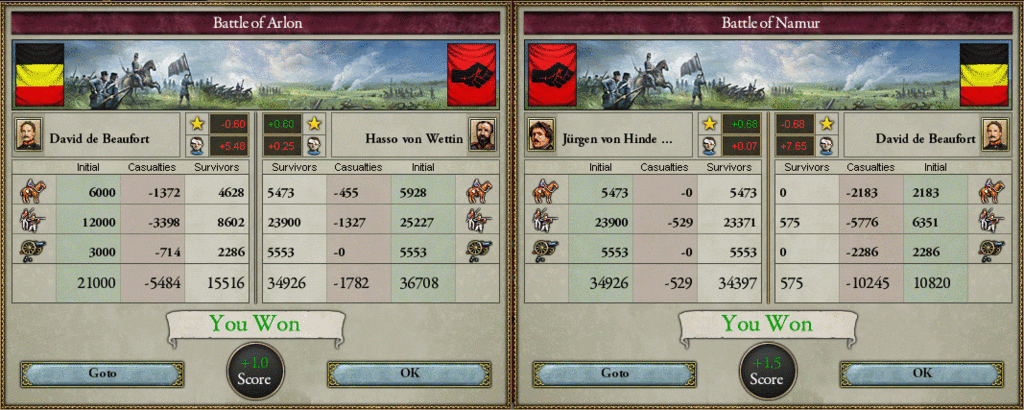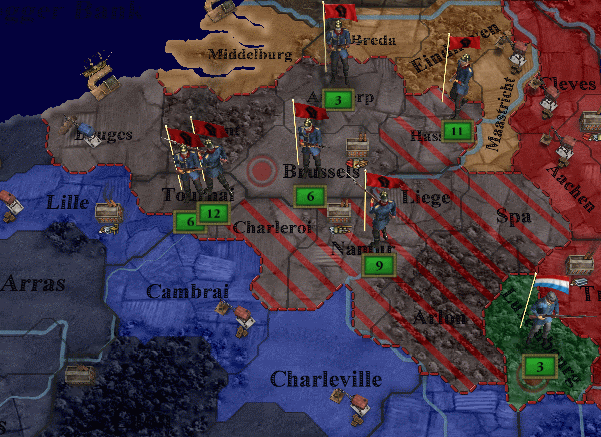The VSVR 1850-1855
Following his narrow victory at the party ballot box the first Chairman, Wilhelm Weitling, faced a mixture of bitterness and strained unity across the non-German Socialist section of the People’s Party and jubilation from his own supporters. On January 14th, just one week after taking office, he unveiled his new budget.
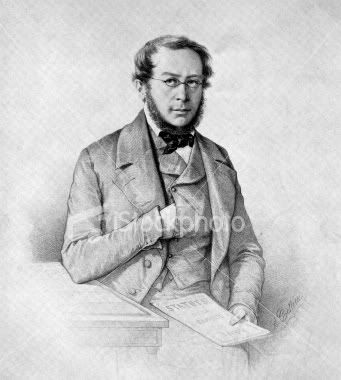
The budget was unveiled by Proudhon, the Commissar for Finance. The Anarchist leader had effectively had the terms of the budget dictated to him by the German Socialist whips. Tax for the poorest was set at 25%, for the middle strata at 35% and for the wealthiest at 50% (5% above the level pledged by Weitling in the election – this was a clear move to try to satiate the Marxist lobby who called for more aggressive action against the ruling classes). Meanwhile the 3% tariff promised to native industry was provided whilst the military budget was raised by a further 5%. Proudhon’s one achievement in getting his own policies pushed through into the budget was a substantial cut to the funding for the Republic’s bureaucracy (funding was slashed to 1/3 of its pre-election level). In industry the steel works in Westfalen were reopened as was the armaments factory in Dusseldorf (the Ruhr) both were to be provided with subsidies by the state whilst the other factories were supposed to provide for themselves (much to the chagrin of their Unions).
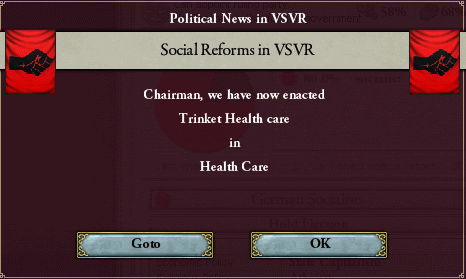
The most symbolically important part of the entire budget was the healthcare reform. The Rhineland already had an, admittedly woefully inadequate, private system of healthcare which had been designed to cater merely for the well off. In the budget this system of hospitals and clinics was seized by the state. However this limited reform to the healthcare system was not well funded enough to provide the free national healthcare supported by the Marxists and instead the publically owned health service didn’t function that differently to the past. Now people would be forced to pay 2/3s of the cost of treating them instead of the entire cost. The government had effectively taken control of an industry and provided it partial subsidies. Despite angering the left of the party who wanted more and alienating the right for expanding government power the reform was quite popular with the public who appreciated the fact that healthcare was now open to thousands of more people even if everyone was not yet able to afford it.
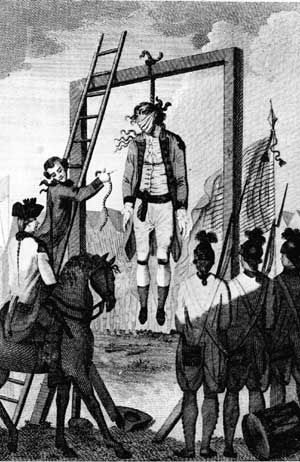
‘’Terror is nothing else than swift, severe, indomitable justice; it flows, then, from virtue."
Within weeks it had become clear that the requisitioning of the property of the ruling classes was not going to be nearly as easy as the revolutionaries had hoped. There was but one man within the upper echelons of government who they knew could deal with this problem – that man was Blanqui. On March 19th 1850 the Extraordinary Commission for Combating Counter-Revolution (AKBC) was set up and Blanqui was made Chairman of the Commission. The AKBC was effectively an internal secret service that functioned totally outside the rules of the state – Blanqui was given carte blanche to ‘remove’ the disruptive elements of the ruling classes.
Initially it is clear that Blanqui attempted to remain unobtrusive to society. He sent men to inform land owners and industrialists that their property was being requisitioned and informed them of the three choice system proposed by the Chairman – they may leave the country, join the proletariat or face execution. However these wealthy individuals quickly deployed every disruptive technique possible to slow the AKBC’s work to a halt. The definition of someone who was a member of the ruling class was wrangled over as was what a proletarian was, letters were sent to dozens of people within the People’s Party who fought for more lenient terms of the wealthy. By September Blanqui had achieved next to nothing and sent a now infamous letter to Weitling in which he requested support from the Chairman for what amounted to a program of terror.
Weitling responded by giving him 10,000 crack, ideologically infallible, soldiers and order to eliminate the ruling classes by any means necessary.
Blanqui quickly dispensed with the trials and all sense of equality. These people were no longer citizens of the VSVR, they were enemies of the state and of the proletariat. Between September 1850 and March 1851, when his mandate was expanded from merely dealing with the ruling classes to securing church property as well, it is estimated the AKBC was responsible for some 35,000 deaths.
Whilst Weitling had promised religious freedom in his electoral campaign he had been forced to clamp down on Christianity in particular due to attempts by the churches of the Rhineland to use their flocks as anchors against being swept away. Laws were rushed through that made it illegal for anyone to protest against church property acquisitions – the punishment for and enforcement of this law was handed over the AKBC (meaning that there would be no protection from VSVR law).
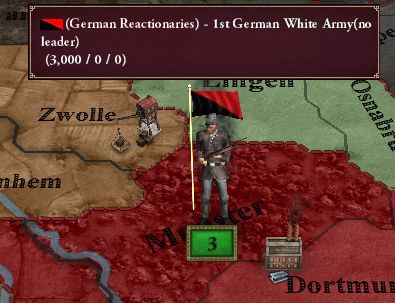
It was in August 1851, at the height of the Red Terror, that 3,000 men rallied around their church in Munster. This self proclaimed White Army that aimed to topple the People’s Party and replace it with a more moderate government quickly came face to face with Blanqui’s AKBC soldiers and was totally annihilated. After a brief intensification of the Terror after the Munster rebellion Blanqui declared his work done in November 1851. Around 150,000 people had been killed but Blanqui had somehow successfully transferred all the property of the ruling classes into the hands of either the state or the people in barely a year and a half. His methods may have been unscrupulous but his achievements were extraordinarily successful.
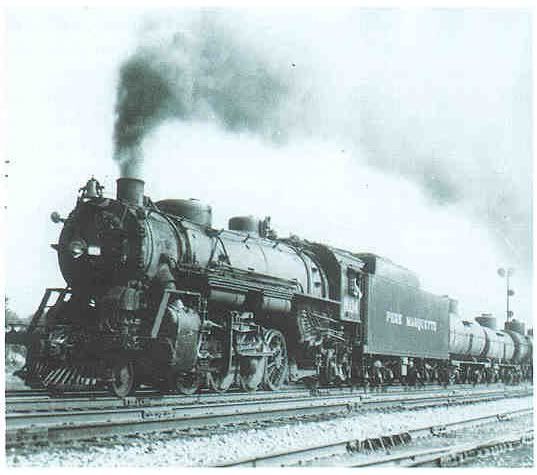
From early 1851 a rapid modernisation of the VSVR rail network began. During the 1840s a small, ragged and unreliable rail network had been built up across the country. Advancements in the field of industrial science made it possible to upgrade this network. As a sign of solidarity with the Unions the state agreed to a part-Union, part-State run modernisation campaign. Within the Ruhr the state paid for the rail modernisation and would subsequently run the network whilst in the upper Rhineland and Westphalia the Unions paid for the modernisation and in return they were given the responsibility to run the network. Control of these railroads, it was hoped, would encourage the Unions to try to develop the less prosperous outlying territories of the Republic (this aim was far from being fulfilled even by 1855). Instead wealth and industrial growth remained heavily concentrated in the Ruhr.
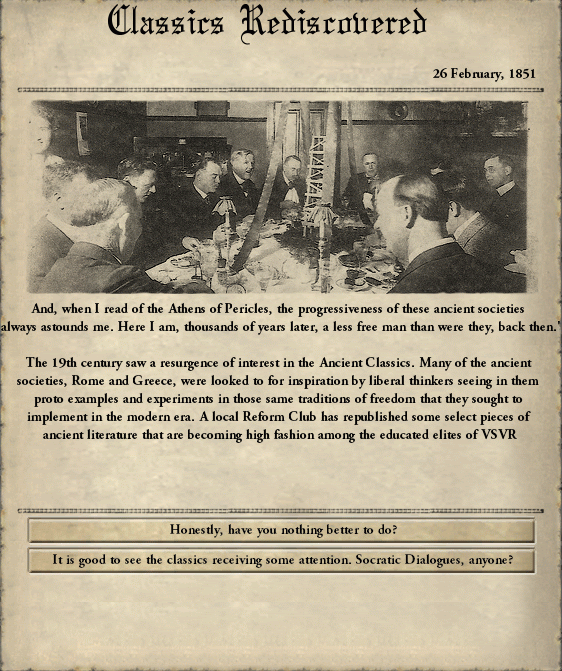
This early period of the Republic also saw a flourishing of classical culture. Ever since the proclamation of the Republic leftists had been flocking in their droves to the Rhineland to experience the greatest social experiment in the history of mankind in person. Several prominent writers started to draw comparisons between the Republic and classical states, one English author wrote an extensive treatise in which he argued that the Rhineland was the ultimate destination of all states that strive to achieve Athenian democracy. For in the VSVR, more than any state since Athens itself, there truly was a democracy for in the VSVR the people did truly rule.
Whilst the chaos of the Red Terror had meant death for thousands and had desperately disturbed the lives of thousands more it would be folly to focus upon it. For within a short time the living conditions of the average Rhinelander started to increase significantly whilst the economy proceeded to rapidly expand and the people, for the first time in centuries, had full confidence in their government. However much of the Rhineland’s most of the Rhineland’s growth had been built on two commodities – coal and iron. The Rhineland controlled the greatest concentration of coal on earth so this was no problem however it possessed no iron ore reserves whatsoever. However just across the border in Belgium (a nation unprotected by a Great Power) there was an abundance of iron ore and an unhappy proletarian populace. The Walloon Crisis would be the single most important political crisis of Weitling’s time as Chairman between 1850 and 1855.
Belgium was one of the first countries on earth to experience an industrial revolution. By the 1830s its industrial capacity could only be matched by France and Britain. However the unabashed support the government of Belgium gave to its industrialist had caused the total collapse of this industry. By 1852 Wallonia’s once mighty industrial base had ceased to exist as the factories had closed down and the capitalists had moved elsewhere. This hard luck story had greatly agitated socialists within Belgium and in January 1852 the Belgian Socialist Vincent van Geyte sent a plea to Weitling to provide arms for the people of Belgium to rise up against their King and establish a Republic like the VSVR. When this letter was spread around the Central Committee it provoked fiery debate.
Weitling strongly supported the idea of expanding the Republic into this territory of national interest although it alienated many of the more Germano-centric German Socialists. Proudhon called for Blanqui (who was also in charge of the secret service) to send arms to van Geyte but not to put the lives of Rhinelanders at risk (Belgium had only recently destroyed a Dutch invasion and had even occupied Amsterdam before a peace was signed). Marx, meanwhile, refused to commit to one side or the other. Personally he was mildly in favour of spreading the revolution into foreign lands (this would help assure many doubters that the Republic was not a Germanic institution but an international one) however much of his faction were fearful of the reaction of France (Engels championed this side of the Marxist faction and Marx was unwilling to openly go against his closest friend and ally).
In the end the decision was put before the Central Committee. Three voted against war (Engels, Proudhon and Bakunin) two abstained (Marx and Eccarius) whilst four voted in favour (Weitling, Feuerbach, Weydemeyer and Blanqui).
The United Socialist People’s Republic was going to war! On March 12th 1852 the VSVR declared war upon Belgium and within a few hours some 48,000 soldiers (around half of them conscripts called up for the invasion alone) poured into Belgium.
On April 17th the first battle of the war took place at Arlon as the Belgian army attempted meet the invading force head on. The result was a mauling at the hands of the more modern and much better trained Rhenish troops. Marshal Weydemeyer (the man in overall command on the war) then ignored the advice of his more cautious Generals on the ground and had the Belgians pursued to Namur where they were subsequently annihilated. With the Belgian Army broken the war was effectively over by mid May but the Belgian government refused to surrender ½ of their country – from the point of view of the Walloon elite in government this was also the better half.
However a summer of unrelenting advance forced the Belgians to give up hope of retaining the South of their country. With most of Wallonia occupied and Brussels itself surrounded the King of Belgian signed away the Francophonic half of his Kingdom.
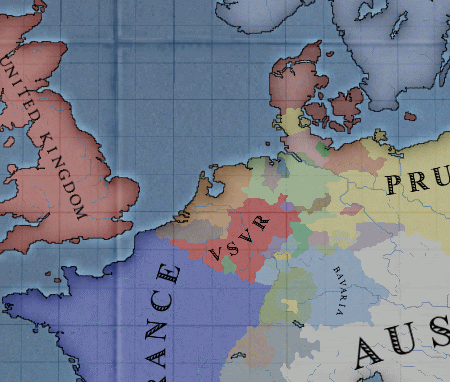
1/3 of VSVR citizens were now Walloons. This dilution of the German nature of the Republic was not met with much enthusiasm back in the Rhineland. Problems were only heightened by the fact that Wallonia needed a significant amount of support from the Cologne government. The factories were reopened and provided with subsidies whilst the state funded a program of modernisation of the rail system to the Rhineland’s recently improved standard. What’s more the literacy rate of the entire Republic dropped from 84% to just 63% after the annexation – this exemplifies the much poorer nature of the new territory. The annexation also brought France to the brink of war, if it wasn’t for an emergency mission to Paris by Friedrich Engels the French would have invaded. Engels managed to convince the French to back down from war by promising to turn the Republic against Prussia and Austria in Germany (the French were uneasy about was in the first place and a promise of further disunity in Germany sealed their support for peace).
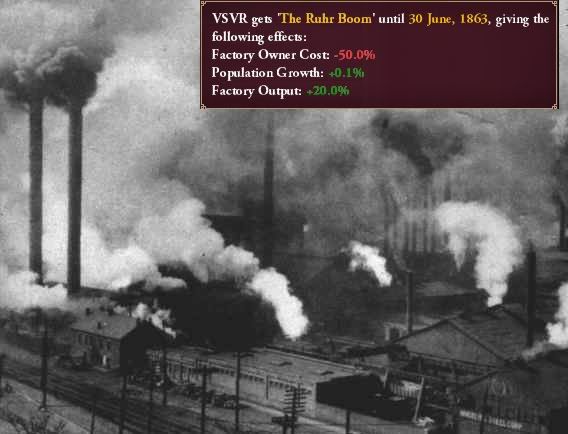
From 1853 the Ruhr saw the start of a 10 year boom that would further transform the already heavily industrial province.
Over the course of 1850-1855 VSVR industry grew by 50%. Whilst the annexation of the un-industrial Wallonia had skewed figures for growth in factory workers for the country as a whole in the Ruhr factory workers had gone from making up 15% of the population in 1850 to making up 20% in 1855. An incredible achievement. However over the course of the 5 years every single factory in the Republic had gained government support through subsidies – by bowing to the Unions in this way Weitling had made his nation’s industry totally reliant on the support of the state.

)








